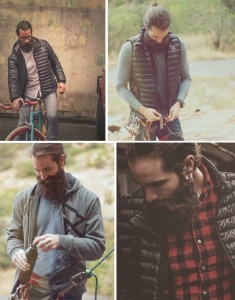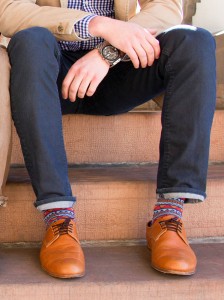
When former BYU student Bryce Fisher didn’t make it into the Marriott School of Business, he didn’t expect to soon create one of the most funded Kickstarter campaigns in start-up heavy Utah.
Ravean, a company focused on battery-powered electric coats and jackets, was founded by Fisher and others looking for active lifestyle jackets they couldn’t find in the market. Fisher said they wanted a “lightweight, fashionable coat” durable enough for activities such as rock climbing, running and hiking. Ravean’s line includes jackets, coats and a vest, all with battery-powered heating that will warm a jacket for up to 10 hours. But what might be the most unique feature is its phone-charging capabilities. The rechargeable battery in the jacket can charge a phone up to six times.
According to Fisher, only .05 percent of Kickstarter projects have broken the million dollar mark, so when founder Ravean asked for $100,000 for its Kickstarter, the company didn’t expect that it would earn $1.33 million within its 60-day campaign. But that’s just what the company did.
Ravean isn’t the only successful Kickstarter out there. Current BYU advertising student Skyler Holman started a Kickstarter in early 2015 for Tuani, a line of shoes. Tuani is focused on creating classy-casual shoes appropriate for any outfit and occasion. The shoes are handmade in Nicaragua.

Holman and team members weren’t worried about reaching their $8,000 goal because of how much positive feedback they had received. Holman said he wonders if their goal was too low after their month-long campaign ended with three times as much as money as they had initially asked for. Holman said the Kickstarter experience was a great taste of what running a business is like.
“It gives anyone a chance to start a business if they have a creative enough idea,” Holman said.
While creating a Kickstarter can have its own challenges, such as using the right media channels and receiving enough exposure to get a product into the public eye, Holman said the experience was a catalyst for growth.
The crowdfunding platforms extend further than Kickstarter with many options such as GoFundMe, Indiegogo and others.
A group of BYU students used Indiegogo as a way to fund their band, Kindred Dead, which opened for Parachute at BYU in spring 2015.
Emmett Florence graduated in marketing from BYU in April 2015. After working at Qualtrics, Florence put in his resignation to be a full-time musician.
“I will never be happy being a part of someone else’s dream machine,” Florence said.

To get their funding off the ground, Florence said the band members decided to go with Indiegogo because of the amount of money they could keep if they didn’t reach their goal of $2,000.
The band was raising money to fund their new EP, “Nowhere To Go But Up,” and to help create and sell their merchandise. Florence said reaching their goal helped them with an “early injection of funds.” He also said the crowdfunding platform gives people a chance to sell things such as a T-shirt or EP for more than they regularly might because people aren’t just buying the merchandise, but are supporting a cause as well.
“I think crowdfunding is great because there are no excuses,” Florence said. “If you have a good idea, put it on the Internet.”




